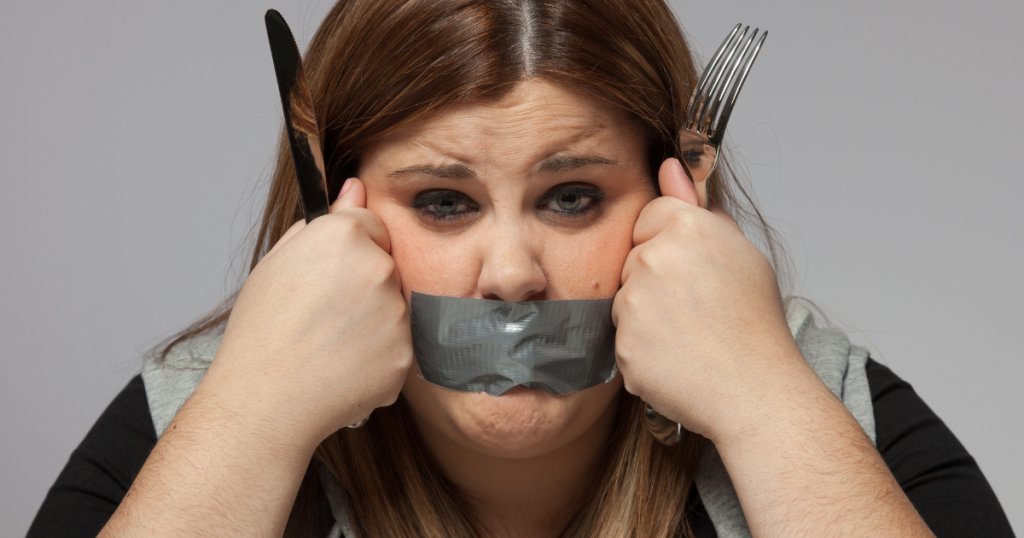It’s a love-hate war, this relationship we have with food and our bodies. We defend ourselves against imagined enemies and march into a battle that is both real and preventable. We win one battle and lose another, compromising health and happiness. Victory. Defeat. Over and over. Too entrenched in the physical and psychological effects of (yo-yo) dieting to simply lay down our weapons and sign a treaty with ourselves.
The role of Diet Culture in (yo-yo) dieting.
Step back and look at the big picture of Diet Culture, and you will inevitably feel sorrow for the lives under its spell.

At its core, Diet Culture demonizes fatness as something to be avoided at all costs. All costs.
It permeates every society, gender, age, race, and socioeconomic class. Kind of like a brainwashing.
Because that’s what it is.
So its obedient followers fall in line, give up nourishment, sneak it back in hiding, and hate themselves in their aspiration for unrealistic ideals.
Body image? Bam! Basically shattered.
Lather, rinse, repeat.
The summoning of sheer willpower is never enough. Never. Enough.
Diet Culture is really just an opportunistic predator, out to capitalize on an undercurrent of self-dissatisfaction.

For all the reasons people fall victim to its restrictive, obsessive, anxiety-inducing rules, there is one yearning that drives them:
They want to feel valuable. Worthy. Beautiful. Accepted.
Food is the most basic and essential source to engage. Without having to excavate what is really essential, true, and life-sustaining. Food becomes an innocent pawn in a self-inflicted battle to fix what is already valuable, worthy, and beautiful…but sadly not accepted.
(Self-inflicted, but culturally mandated.)
And humans have been waging this war for ages.
What are the physical effects of (yo-yo) dieting?
Before we talk about the psychological effects of (yo-yo) dieting, let’s look at some of its physical effects. The two, after all, are intimately connected.
First, let’s set the scene for (yo-yo) dieting.

It’s the down-up, lose-gain cycle whose upside is never a win for the dieter.
And even those who are given a rude “health” awakening – whose motivation is grounded in “legitimacy” – are vulnerable to it.
Perhaps you’ve heard the “diets don’t work” warning so many times, you’re convinced it’s unfounded. You’re looking at Instagram photos, magazines, and TV ads that make that perfectly clear.
(That is the reason for the parentheses around “yo-yo” dieting. Plain and simple – no need to even include the word “yo-yo” because all dieting is temporary, as are any changes in body weight, more often than 95% of the time.)
So, to drive home the truth, let’s start with what really happens to your body when your weight and eating habits head for the hills.
Here are some of the physical effects of (yo-yo) dieting.

- One year after losing weight, at least 1 in 3 people gain it back. And five years seems to be a lost cause.
- Loss of fat means decreased leptin released into the bloodstream. Leptin is a hormone that tells your appetite, “We’re good here. We’ve got fuel for the winter. No need to go crazy on the doughnuts.” Less leptin? More hunger…because, you know, you might be starving.
- Weight loss is never “all fat.” Muscle hits the entrance ramp, too. That means less energy, less strength, and a slowed metabolism. And, when the weight starts to creep back on, fat comes back more quickly than muscle, leading to a higher body fat percentage.
- Yo-yo dieting and weight swings have been linked to cardiovascular problems like angina, heart attacks, and strokes, and increased mortality from coronary heart disease.
- Risk of gallstones, fatty liver, and diabetes increases with too much weight and with big swings in weight.
- Cortisol increases as the stress of weight gain and yo-yo dieting increases. And cortisol is linked to a laundry list of health issues and morbidities.
- Yo-yo dieting messes with your gut bacteria.
- Big swings in weight can have long-term health effects, regardless of where you end up on the scale.
The psychology of weight loss is really what’s in charge.
It’s not your willpower (or lack thereof). It’s why you’re trying to lose weight in the first place…and what happens psychologically when your intentions don’t manifest linearly.
There may be a downside to carrying too much weight. And, there may be benefits to attaining and maintaining a body weight that is right for YOUR body.
But your eating habits and weight are your business – and your choice.
And yo-yo, “bikini-season,” “annual-exam-and-bloodwork-coming-up” rules are never the answer.
So let’s talk about what happens psychologically with yo-yo dieting.

Before you piggyback on the misguided notion that you’ll just skip these potential hazards by losing weight and keeping it off, remember why we’re here.
What are the psychological effects of (yo-yo) dieting?
If you’ve ever tried to lose weight — for whatever reason — you know how mentally and emotionally demanding the effort is.
It’s one thing to steer clear of the dessert table for one day. But day…after day…after day?
There’s the weighing, the body-checking, and the constant comparing. And it all takes a toll on the psyche. It’s the first thing you think of when you wake up, and one of the last things you think of when you go to bed. (And probably most of the time in between, you are preoccupied with thoughts stemming from dieting.)
The negative physical effects of (yo-yo) dieting bear their own psychological consequences: stress, worry, fatigue, isolation, mental illness.
If the needle on the scale could only measure more than physical weight….
To demonstrate how going for svelte can wreak havoc with your mental and emotional life, here are 10 psychological effects of yo-yo dieting:
- Risk of developing or exacerbating an eating disorder, especially binge eating disorder (BED).
- Decreased motivation and increased expectation of failure due to the inevitable inability to succeed with fad or yo-yo diets.
- Low self-image/self-esteem due to repeated failure to lose weight, maintain weight loss, and/or achieve societal standards for beauty.
- Internalized weight stigma.
- Damaged body image.
- Short-term thinking about food instead of a long-term mindshift, leading to a bad relationship with food.
- Feelings of depression and/or anxiety.
- Increased stress from frustration and failure.
- Body dysmorphic disorder.
- Decreased life satisfaction.

Finding a way to health and happiness without dieting.
It’s sadly ironic that the yearning behind dieting is for success (or the perception of it) — to be more beautiful, more desirable, even healthier.
And yet, using diets to achieve that success is a set-up for failure from the start.
Only with a long-term mindset toward health and a self-esteem that can turn its back on Diet Culture can you beat yo-yo dieting at its own game.
Dr Elayne Daniels is an anti-diet, Intuitive Eating certified psychologist, consultant, coach, and author specializing in eating disorders. She is passionate about helping people of all ages and genders recover and truly live their lives. Contact her here to learn more. And if you’re struggling with overcoming an eating disorder, this e-book might be useful.


